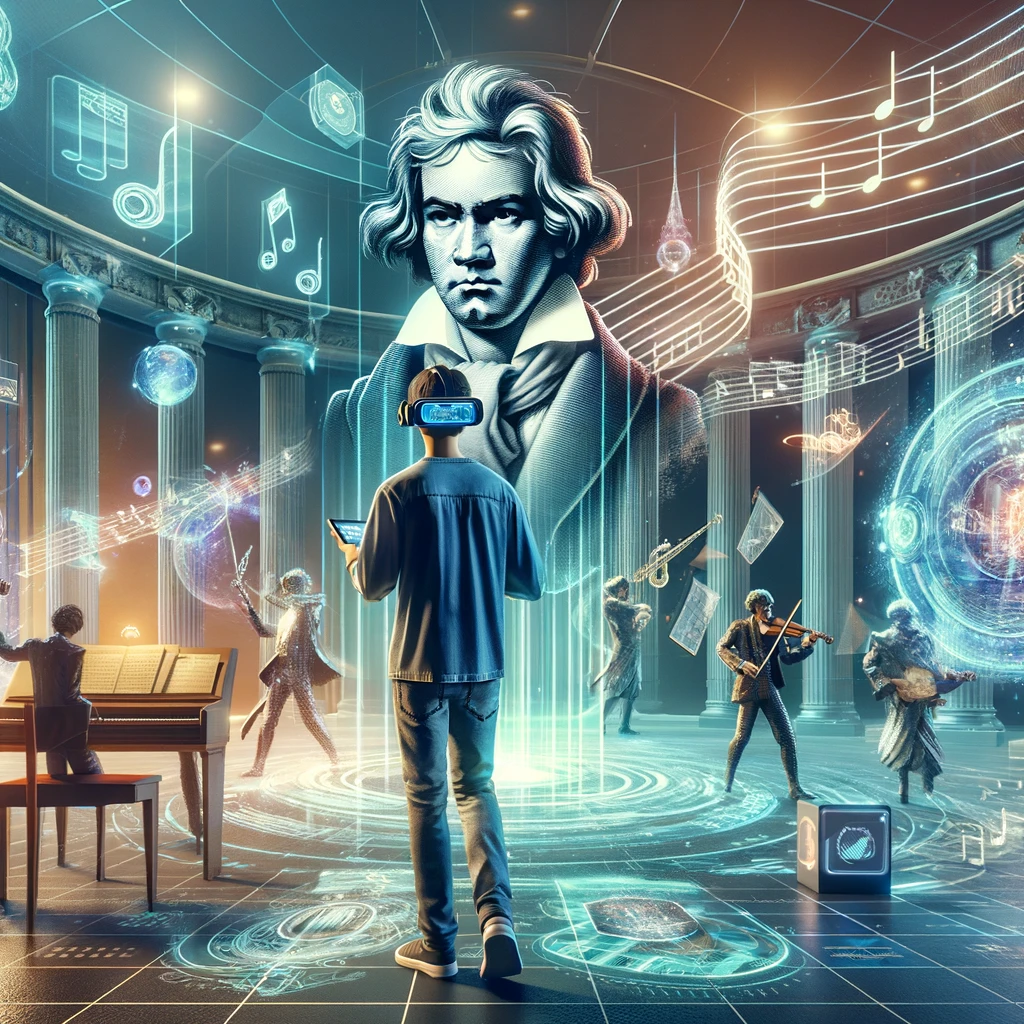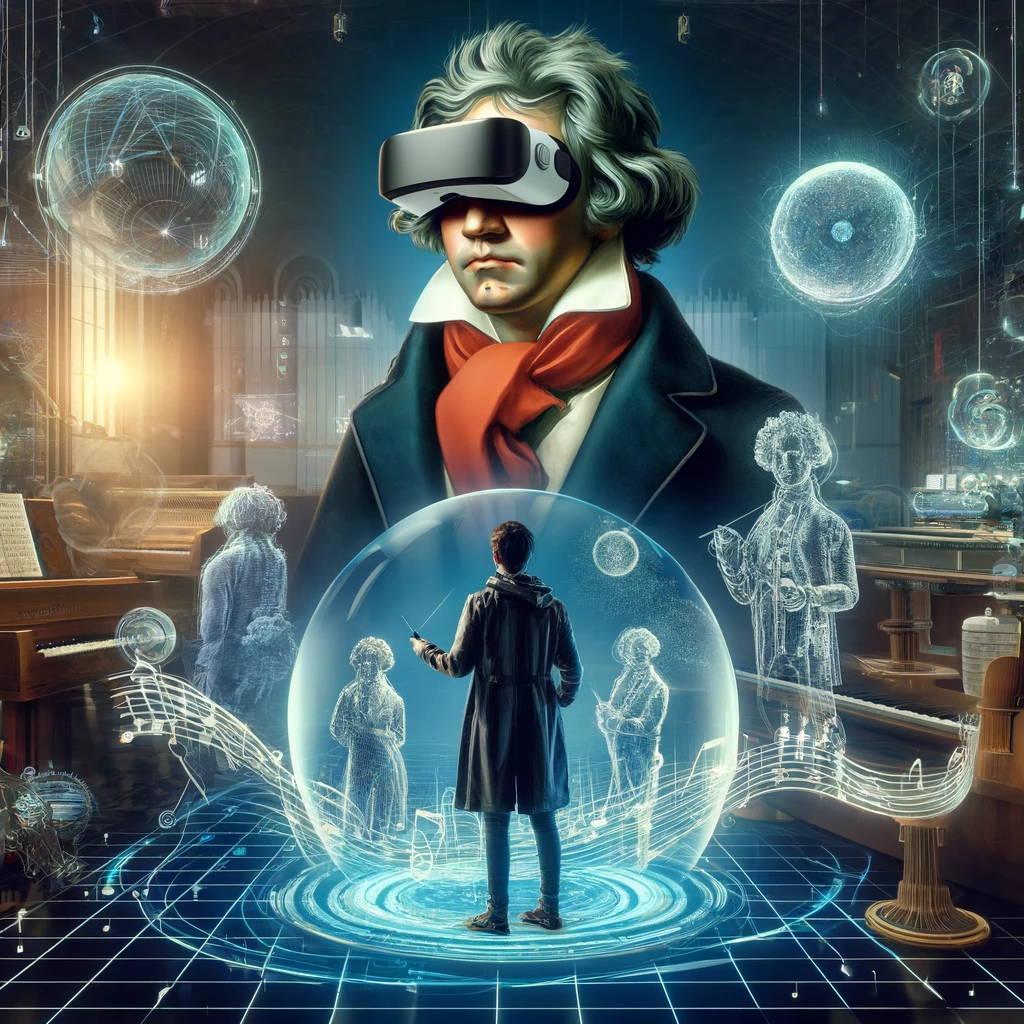
Beethoven & Tech: Exploring VR Experiences
Ludwig van Beethoven, a name synonymous with classical music, continues to influence and inspire, transcending the boundaries of time and technology. While Beethoven himself navigated a world without electricity, today’s technological advancements have the power to bring his compositions into the modern era in ways previously unimaginable. This article explores how virtual reality (VR) and interactive experiences are revolutionizing our engagement with Beethoven’s legacy.
Bringing Beethoven to Life with Virtual Reality
Imagine stepping into a room and being transported to 19th century Vienna, the sounds of a grand piano playing Beethoven’s Moonlight Sonata enveloping you. This is the promise of virtual reality: to not only hear Beethoven’s music but to experience it in a multisensory way. VR platforms are now capable of creating immersive environments that mimic the concert halls and salons where Beethoven once performed. These experiences allow users to feel as if they are present at a live Beethoven concert, complete with the ability to look around the room, see the audience in period attire, and even observe Beethoven’s intense expressions as he plays.
Educational Opportunities
VR also serves as a powerful educational tool. Interactive programs can guide users through Beethoven’s compositions, highlighting key changes in tempo, melody, and harmony. For instance, educational VR experiences can illustrate the structure of Beethoven’s Fifth Symphony, showing how motifs are developed and transformed across movements. Users can interact with different sections of the orchestra, isolating instruments to hear how each contributes to the overall piece, providing a deeper understanding of orchestration and composition techniques.
Accessibility Enhancements
For those with hearing impairments, VR technology offers new ways to experience Beethoven’s music. Vibrational technology embedded in VR platforms can translate sounds into tactile experiences, allowing users to feel the music through vibrations. This technology not only opens up new sensory experiences but also ensures that Beethoven’s works are more accessible to everyone, regardless of hearing ability.
Interactive Experiences: Engaging a New Generation
Beyond virtual reality, other forms of interactive technology are making Beethoven’s work more accessible and engaging. Apps and digital exhibits allow users to interact with Beethoven’s scores, play with musical elements, and even compose their own music using Beethoven-like motifs.
Mobile Apps
Several mobile apps now allow users to explore Beethoven’s music interactively. These apps often include features such as animated scores that scroll in real-time as the music plays, detailed analyses of compositions, and even games that challenge users to identify Beethoven’s themes or reconstruct his melodies. These apps make learning about Beethoven fun and engaging, appealing to both young audiences and those new to classical music.
Digital Exhibits
Museums around the world are incorporating digital exhibits into their displays on Beethoven. Through touch screens and interactive displays, visitors can engage with digital manuscripts, compare various revisions of his works, and learn about the historical context of his compositions. These digital exhibits often include listening stations where visitors can hear rare recordings and experimental renditions of Beethoven’s pieces, further enriching their understanding and appreciation of his music.
The Future of Beethoven in the Digital Age
As technology continues to evolve, the potential for new types of interactive experiences grows. Augmented reality (AR) is one area poised to expand Beethoven’s reach. AR apps could overlay information about Beethoven’s life and works onto the real world, turning a walk through a city park into an educational journey through Beethoven’s Vienna. Imagine pointing your smartphone at a statue of Beethoven and seeing animations that tell stories of his life and music.
Furthermore, advancements in artificial intelligence (AI) could allow us to experience Beethoven’s unfinished works completed by AI, based on his compositional styles. This not only preserves his legacy but also sparks conversations about the intersection of technology and human creativity.
Beethoven’s legacy is not confined to the past; it is a vibrant, evolving force that continues to resonate thanks to modern technology. Virtual reality and interactive experiences breathe new life into his music, making it more accessible, educational, and engaging. These technologies not only preserve his work but also ensure it continues to inspire and influence, demonstrating that even centuries later, Beethoven remains a pivotal figure in not only music but in the realm of cultural innovation.

The Role of AI in Interpreting Beethoven’s Music
Artificial intelligence is not only completing Beethoven’s unfinished symphonies; it’s also helping to interpret his music in new ways. AI algorithms can analyze the emotional content of Beethoven’s compositions, providing insights into the emotional dynamics of his music. This can lead to innovative performances where orchestras use these insights to enhance the emotional impact of their renditions. Additionally, AI is used in interactive exhibits to answer visitor questions about Beethoven’s work or provide personalized tour experiences based on the visitor’s expressed interests.
Personalized Learning Experiences
With AI, personalized learning experiences are becoming a reality. AI systems can track a user’s progress through an interactive course on music theory and adapt the curriculum to fit their learning pace and style. For Beethoven enthusiasts, this means that they can receive customized lessons that focus on his techniques, delve into analyses of his most complex works, or even simulate virtual one-on-one sessions with the maestro himself, reconstructed based on historical records and writings.
Virtual Reality Concerts
The development of virtual reality concerts offers a particularly exciting avenue for experiencing Beethoven’s music. Users can attend a virtual Beethoven concert from anywhere in the world, choosing between historical performances recreated based on meticulous research or entirely new concerts conducted by AI avatars of famous conductors. These experiences can be enhanced by interactive features that allow users to choose different acoustical settings, from a small Vienna salon to a large modern concert hall, changing the listening experience dynamically.
Bridging Generations
One of the most significant impacts of integrating technology with Beethoven’s music is the ability to bridge generations. Young people who might not ordinarily listen to classical music are drawn in by the technological aspects of these interactive experiences. Gamification elements, like earning points for identifying musical motifs or completing compositional challenges, make learning about Beethoven’s music compelling and enjoyable.
Collaborative Experiences
Technology also enables collaborative experiences that bring together musicians and audiences worldwide. Online platforms allow musicians from different parts of the world to come together and perform Beethoven’s works. Audiences can influence performances in real-time by voting on interpretations or suggesting changes, making each performance unique and engaging.
Archiving and Preservation
Finally, technology plays a crucial role in preserving Beethoven’s legacy. High-resolution digitization of Beethoven’s original manuscripts ensures that they are preserved for future generations without the risk of physical deterioration. Virtual archives make these documents accessible to scholars and enthusiasts globally, providing unprecedented access to Beethoven’s handwritten notes and revisions.
Looking Forward: The Continual Evolution of Beethoven’s Legacy
As we look to the future, it’s clear that technology will continue to play a vital role in how we experience, interpret, and preserve the works of Beethoven. From more sophisticated VR experiences to AI-driven performances and analyses, the fusion of technology and classical music is not just about preservation—it’s about revolutionizing how we interact with music. Beethoven’s compositions have stood the test of time, and with the help of modern technology, they are set to inspire and educate for generations to come.
In the rapidly evolving digital age, Beethoven remains relevant, proving that great music can transcend time and technology. These advancements ensure that his profound impact on the world of music will continue to be felt, and his works will continue to be explored in new and exciting ways.